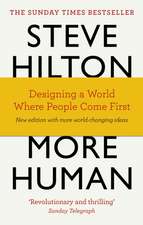United States Health Care Policymaking: Ideological, Social and Cultural Differences and Major Influences: Springer Texts in Business and Economics
Autor Sunday E. Ubokudomen Limba Engleză Paperback – 8 mai 2014
Consequently, health care reform has continuously been on the public and governmental agendas. It is out of this environment that several reform plans, including the 1993 Health Security Act, and the 2010 Patient Protection and Affordable Care Act (PPACA), were launched. This book examines the ideological, social, cultural, economic, and several other factors that dictate the various measures and approaches employed to tackle the perceived problems. The book has an index, tables, charts and figures, lists of major terms, and review questions for each chapter. This book will appeal to students in Master of Health Administration (MHA), Master of Public Health (MPH), Master of Public Administration (MPA), Master of Science in Nursing (MSN), health certificate programs, and junior and senior level undergraduate students in political science, public administration, public health, and public policy. In addition to serving as a core text for health policy and administration classes, the book will serve as a supplementary text for graduate level courses.
| Toate formatele și edițiile | Preț | Express |
|---|---|---|
| Paperback (1) | 422.31 lei 6-8 săpt. | |
| Springer – 8 mai 2014 | 422.31 lei 6-8 săpt. | |
| Hardback (1) | 384.22 lei 38-44 zile | |
| Springer – 12 apr 2012 | 384.22 lei 38-44 zile |
Din seria Springer Texts in Business and Economics
- 17%
 Preț: 460.16 lei
Preț: 460.16 lei -
 Preț: 548.24 lei
Preț: 548.24 lei - 17%
 Preț: 490.70 lei
Preț: 490.70 lei - 13%
 Preț: 447.86 lei
Preț: 447.86 lei - 19%
 Preț: 509.83 lei
Preț: 509.83 lei -
 Preț: 360.01 lei
Preț: 360.01 lei -
 Preț: 374.87 lei
Preț: 374.87 lei - 17%
 Preț: 523.85 lei
Preț: 523.85 lei -
 Preț: 374.14 lei
Preț: 374.14 lei -
 Preț: 185.09 lei
Preț: 185.09 lei - 17%
 Preț: 522.64 lei
Preț: 522.64 lei - 19%
 Preț: 465.60 lei
Preț: 465.60 lei - 15%
 Preț: 642.51 lei
Preț: 642.51 lei - 18%
 Preț: 754.79 lei
Preț: 754.79 lei - 19%
 Preț: 534.43 lei
Preț: 534.43 lei -
 Preț: 360.45 lei
Preț: 360.45 lei -
 Preț: 359.92 lei
Preț: 359.92 lei - 17%
 Preț: 363.29 lei
Preț: 363.29 lei - 17%
 Preț: 363.97 lei
Preț: 363.97 lei -
 Preț: 473.41 lei
Preț: 473.41 lei -
 Preț: 361.11 lei
Preț: 361.11 lei - 8%
 Preț: 428.31 lei
Preț: 428.31 lei - 15%
 Preț: 479.55 lei
Preț: 479.55 lei - 13%
 Preț: 490.92 lei
Preț: 490.92 lei - 15%
 Preț: 650.55 lei
Preț: 650.55 lei -
 Preț: 382.19 lei
Preț: 382.19 lei - 15%
 Preț: 562.12 lei
Preț: 562.12 lei -
 Preț: 367.40 lei
Preț: 367.40 lei -
 Preț: 401.78 lei
Preț: 401.78 lei -
 Preț: 361.88 lei
Preț: 361.88 lei - 15%
 Preț: 562.31 lei
Preț: 562.31 lei - 17%
 Preț: 491.51 lei
Preț: 491.51 lei - 20%
 Preț: 819.22 lei
Preț: 819.22 lei - 15%
 Preț: 597.20 lei
Preț: 597.20 lei -
 Preț: 320.05 lei
Preț: 320.05 lei - 20%
 Preț: 694.02 lei
Preț: 694.02 lei - 20%
 Preț: 693.45 lei
Preț: 693.45 lei -
 Preț: 548.52 lei
Preț: 548.52 lei - 17%
 Preț: 459.66 lei
Preț: 459.66 lei - 17%
 Preț: 366.15 lei
Preț: 366.15 lei - 20%
 Preț: 693.81 lei
Preț: 693.81 lei -
 Preț: 555.90 lei
Preț: 555.90 lei - 9%
 Preț: 766.63 lei
Preț: 766.63 lei
Preț: 422.31 lei
Nou
Puncte Express: 633
Preț estimativ în valută:
80.81€ • 84.60$ • 66.86£
80.81€ • 84.60$ • 66.86£
Carte tipărită la comandă
Livrare economică 05-19 aprilie
Preluare comenzi: 021 569.72.76
Specificații
ISBN-13: 9781489990426
ISBN-10: 1489990429
Pagini: 312
Ilustrații: XXVI, 286 p.
Dimensiuni: 155 x 235 x 16 mm
Greutate: 0.44 kg
Ediția:2012
Editura: Springer
Colecția Springer
Seria Springer Texts in Business and Economics
Locul publicării:New York, NY, United States
ISBN-10: 1489990429
Pagini: 312
Ilustrații: XXVI, 286 p.
Dimensiuni: 155 x 235 x 16 mm
Greutate: 0.44 kg
Ediția:2012
Editura: Springer
Colecția Springer
Seria Springer Texts in Business and Economics
Locul publicării:New York, NY, United States
Public țintă
GraduateCuprins
1.Systemic Problems, Definitional and Ideological Issues.-2.The Evolution of the U.S. Health Care System.-3.Constitutional, Political and Legal Influences.-4.Economic and Provider Influences.-5.Technological Influences.-6.Physical, Social and Cultural, and Global Influences.-7.Demographic Influences.-8.Safety Net Programs – Medicare, Medicaid, and SCHIP (CHIP).-9.Health Care Reform in the United States.-10.Conclusion.
Recenzii
From the reviews:
“This book is unique in the way it presents health policy in the context of the Patient Protection and Affordable Care Act (PPACA). … The intended audience is healthcare professionals, undergraduate and graduate students, policy students, and others interested in health policy. … There are many health policy books on the market. This one is unique because it is easy to read and understand and it addresses the controversies that are setting the stage for the next round of healthcare policy debates.” (Carole Ann Kenner, Doody’s Review Service, June, 2012)
“This book is unique in the way it presents health policy in the context of the Patient Protection and Affordable Care Act (PPACA). … The intended audience is healthcare professionals, undergraduate and graduate students, policy students, and others interested in health policy. … There are many health policy books on the market. This one is unique because it is easy to read and understand and it addresses the controversies that are setting the stage for the next round of healthcare policy debates.” (Carole Ann Kenner, Doody’s Review Service, June, 2012)
Notă biografică
Sunday Ubokudom
Textul de pe ultima copertă
Health care is a very important component of the American economy. The United States Centers for Medicare and Medicaid Services (CMS) put the 2008 direct health care expenditures at about $2.34 trillion, or about 16.2 percent of the nation’s gross domestic product (GDP), or an average of $7,681 spent for every man, woman, and child in the country. Health care cost increases have caused very serious problems that threaten to bankrupt the system, providers, employers, and the families that pay the costs that their health insurance plans do not cover. Additionally, cost increases have reduced access to health care services, adversely aff ected the quality of care, and resulted in avoidable illnesses, premature deaths, and in health disparities based on race, ethnicity, and income.
Consequently, health care reform has continuously been on the public and governmental agendas. It is out of this environment that several reform plans, including the 1993 Health Security Act, andthe 2010 Patient Protection and Aff ordable Care Act (PPACA), were launched. Th is book examines the ideological, social, cultural, economic, and several other factors that dictate the various measures and approaches employed to tackle the perceived problems. The book has an index, tables, charts and fi gures, lists of major terms, and review questions for each chapter. Th is book will appeal to students in Master of Health Administration (MHA), Master of Public Health (MPH), Master of Public Administration (MPA), Master of Science in Nursing (MSN), health certificate programs, and junior and senior level undergraduate students in political science, public administration, public health, and public policy. In addition to serving as a core text for health policy and administration classes, the book will serve as a supplementary text for graduate level courses.
Consequently, health care reform has continuously been on the public and governmental agendas. It is out of this environment that several reform plans, including the 1993 Health Security Act, andthe 2010 Patient Protection and Aff ordable Care Act (PPACA), were launched. Th is book examines the ideological, social, cultural, economic, and several other factors that dictate the various measures and approaches employed to tackle the perceived problems. The book has an index, tables, charts and fi gures, lists of major terms, and review questions for each chapter. Th is book will appeal to students in Master of Health Administration (MHA), Master of Public Health (MPH), Master of Public Administration (MPA), Master of Science in Nursing (MSN), health certificate programs, and junior and senior level undergraduate students in political science, public administration, public health, and public policy. In addition to serving as a core text for health policy and administration classes, the book will serve as a supplementary text for graduate level courses.
Caracteristici
Surveys the national reaction to the Obama Administration’s health care reform plan and the Patient Protection and Affordable Care Act (PPACA) of 2010 Investigates the impacts of various environmental factors on the health policy making process in the United States Surveys the range of social and political factors that influence health care policy making and delivery in the United States





